Handle Exposure: G3
Exposure via Contests
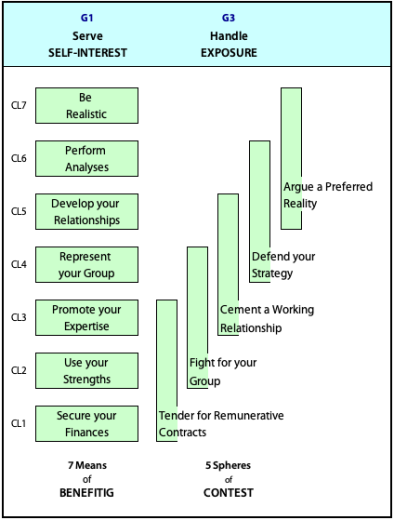
It is in your interest to have a visible presence in society. The challenge is how that presence can best serve your interests. It is usually wise to keep your head down and only speak up when it is necessary to rise to the occasion.
If exposure is unavoidable, then it needs to be genuine. That way your outer world and your inner world will be in harmony. But self-protection remains a priority at this point, and so you need to ask yourself whether the exposure is practical. Will it achieve anything for you or your group?
In all cases, exposure means that you will be in a contest because there will be others who want to take your place, and so self-assertion here is expressed as positioning.
By adding one adjacent monad, 5 triadic groups are formed, each of which represents an important requiring you from time to time to step up to the plate.
The function of the triads is to construct your social identity and the contests that do this and expose you are:
- : Bidding for remunerative contracts
- : Fighting for your group
- : Cementing a working relationship
- : Defending your strategy
- : Arguing a preferred reality.
The qualifier for these , related to , is proposed as «passionate». That means that you proceed with an strong belief in the genuine importance of your activity. The term does not refer to emotional flamboyance but rather to an inner seriousness (cf. passion in creativity). When you allow , you are fully aware that you are forwarding your own interests and you want to be taken seriously by others.
The 5 Triadic Groups
G31: Bid for Remunerative Contracts
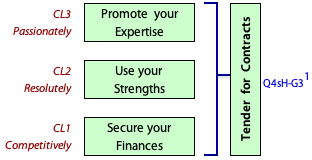
Function: To ensure longer term financial security.
The obvious example here is an application for a job. However, it applies to winning a sale, or funding a project, and other similar situations. Such transactions form the foundation of how others see you.
To bid (or apply or tender) effectively, you must expect to be in competition for the finances on offer (). So you must passionately promote your expertise (), and use your strengths resolutely () to maximize your likelihood of being selected.
G32: Fight for Your Group
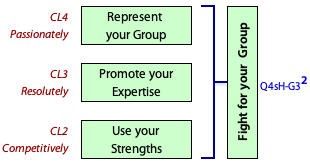
Function: To gain supporters for your values and goals.
"Group" covers an immense variety of possibilities, from the most general, like consumers in society or users of an online service, to the most specific like the organization where you work, your professional body, or a local sports club. "Fight" also covers many things from merely speaking up firmly, to active campaigning, to forceful initiatives. Whistleblowers fit in here: although they
If your activity in any group is disrupted or under threat, then you and others must fight for the group. If you deliberately avoid the fight, you are likely to suffer consequences. Free-riding on the efforts of others is possible, but has its own risks if others notice.
When your activity, outfit or project is under stress or threat, you need to passionately represent your group (). To fight effectively, you must use your strengths ()—but so will others i.e. it is competitive. You must be resolute in promoting your expertise ().
G33: Cement a Working Relationship
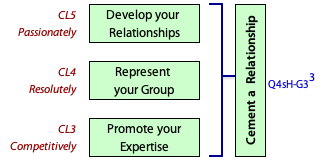
Function: To sustain ongoing transactions via personalization.
"Working" refers to attempting anything jointly with a common purpose, not necessarily paid work or business dealings.
Working with someone is not just a matter of your or their technical skill and knowledge, it also involves matters like mutual courtesy, sensitivity, reliability, and helpful attitudes. When you find someone with whom you enjoy working, it is in your interest to solidify that relationship.
A working relation depends on your provision of expertise () and it will only be cemented if it is competitive. Subject to that, being passionate in developing a trusting relationship () is the enabling feature. At all times you need to represent your group resolutely () to keep efforts on track.
G34: Defend Your Strategy
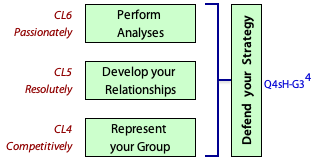
Function: To produce the best result for your group.
The end goal is often easily agreed in a group, while how to get there can be far more controversial. If you develop a strategy for the group, then demonstrating conviction can improve your standing.
When it comes to the direction your group should be taking, you will find disagreements among members. Each protagonist claims to represent the best interests of the group (), which means you are competing with them for influence. To do so, you must be passionate about the analyses you have performed (). Meanwhile the group must remain unified and that means being resolute in maintaining and developing relationships ().
G35: Argue a Preferred Reality
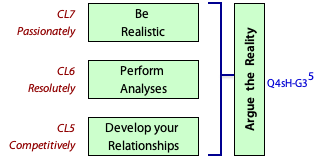
Function: To steer the thinking of significant others.
Wrong thinking is the source of problems, and it typically flows from a distortion or denial of reality. By helping others be more realistic you can steer them and any joint effort in a more appropriate direction. Such steering requires much more than simple assertion that you know better.
Each person adheres intensely to their view of reality, so only those with whom you have a strong relationship are likely to listen to your arguments. Even then you must be passionate about what you view as realistic ). You will be in competition for those relationships () and your likely success will depend on being resolute in performing analyses ().
Transition
At this point, you are able to reduce your vulnerability by focusing on , by establishing a foothold through taking sensible , and by obtaining and preserving your place in society through well-judged and passionate .
This makes it possible to take the next step and become satisfied, even perhaps gratified. Doing so depends on systematic interactions with others in order to make exchanges.
This is made possible by adding one more adjacent level to form tetrads.
- Continue with exchanges-G4 Tetrads.
- Go to the review to see the full picture.
Originally posted: 10-July-2025.
